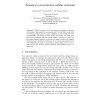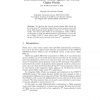495 search results - page 17 / 99 » Automata and differentiable words |
MFCS
2009
Springer
14 years 2 months ago
2009
Springer
Abstract. Cellular automata (CA) are discrete, homogeneous dynamical systems. Non-surjective one-dimensional CA have
nite words with no preimage (called orphans), pairs of dieren...
FSMNLP
2005
Springer
14 years 1 months ago
2005
Springer
TAGH is a system for automatic recognition of German word forms. It is based on a stem lexicon with allomorphs and a concatenative mechanism for inflection and word formation. Wei...
FSE
2007
Springer
13 years 11 months ago
2007
Springer
The previous key recovery attacks against Helix obtain the key with about 288 operations using chosen nonces (reusing nonce) and about 1000 adaptively chosen plaintext words (or 23...
SIMULATION
2002
13 years 7 months ago
2002
Trend is a two dimensional cellular automata programming environment with an integrated simulator and a compiler. Trend has many unique features such as simulation backtracking, c...
APNOMS
2006
Springer
13 years 11 months ago
2006
Springer
In this paper, we propose two mechanisms, differentiation by backoff exponent and differentiation by the size of contention window, for IEEE 802.15.4 sensor networks to provide mul...


